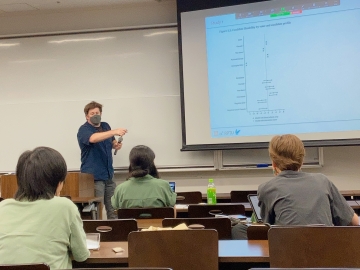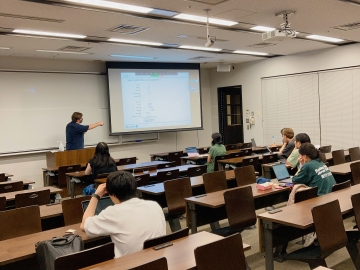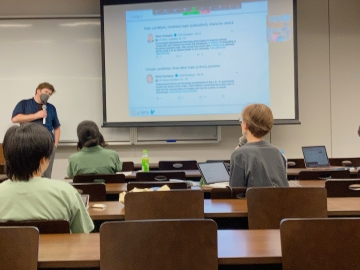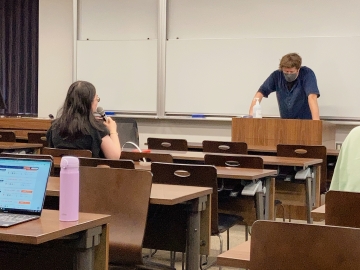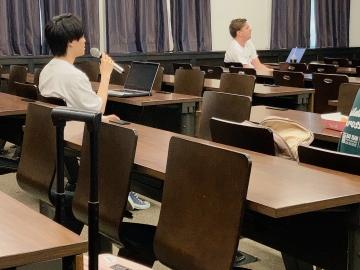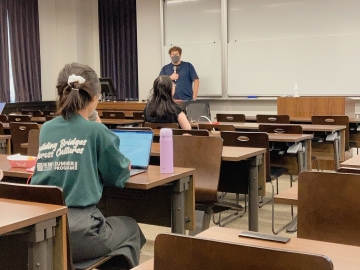On 7 August 2023, the Centre for Empirical Analysis of Political Economy hosted a special seminar with Alessandro Nai of University of Amsterdam, who is a visiting assistant professor at the Graduate School of Political Science this summer quarter.
Seminar report by Robert Nordström, D4, Political Science, Waseda University
TGU Seminar report
“A new way of looking at how negative campaigning backfires more often for women than
for men – My thoughts on the presentation “Gendered Backlash: Reassessing Negative
Campaigning Sanctions for Women via Survey, Observational, and Experimental Evidence”
by Alessandro Nai “
In this seminar, Prof. Nai presented a new research project which looked at how gender affected how strongly candidates were punished when they went negative in their electoral campaign. The project looked at the question using a diverse array of methods, including observational data, a survey experiment, and an expert survey from more than 120 elections worldwide. The final verdict was that overall, the evidence pointed to the fact that women were significantly more likely to be punished for using negative campaigning methods than were male counterparts, thus indicating the strong presence of gendered stereotypes in voters. Further, the studies found evidence that this effect was especially present in countries with poor gender equality, highlighting the importance of a comparative focus.
Prof. Nai started his presentation by discussing the importance of negative campaigning in elections. Using the 2016 U.S. presidential election to set the stage, he showed how important negative campaigning is in modern electoral campaigns and further argued that Hillary Clinton had been less successful in her negative campaigning than had Donald Trump, perhaps indicating a gender bias. The argument is that as a woman, voters expected Clinton to be more caring and kinder while they expected Donald Trump to be aggressive. Therefore, it was argued, when Clinton did use more aggressive campaign tactics, voters perceived these more negatively than they did when Trump did the same.
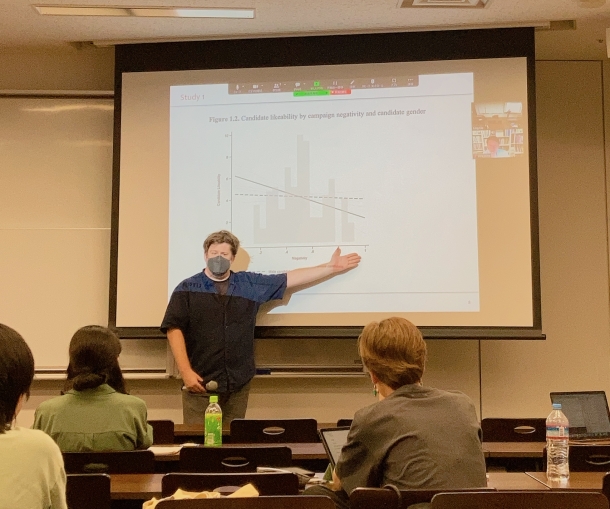
In the presentation, it was said that every politician attacks. Negative campaigns are used by every type of politician, and the reason is that negative campaigning works. Negative campaigning can captivate the attention of the public and help mobilize voters to the polls. On the other hand, research has also been shown to have negative impacts on democracy such as increasing distrust in politicians and even increasing support for political violence. Negative campaigning can however also backfire and lead to politicians losing trust for the politician making the attacks. The public in general dislikes negative campaigning and in case candidates go too far in their attacks, this tends to backfire against them. The question of the paper however is, does negative campaigning backfire more for women? I thought this part of the presentation was very informative since it introduced the role negative campaigning has in our modern democracies. It is not necessarily a good influence however it is something that exists and needs to be studied to better understand.
The presentation then went on to discuss the other main issue of the study which was gender stereotypes. Gender stereotypes exist over the whole world, and these stereotypes affect politics just as much as it affects any other part of society. In general, women tend to be seen as the public as being kinder, more caring, and overall, less aggressive than men. According to expectation violation theory, when women go against the stereotypes that they are supposed to be kind and caring by doing aggressive campaigning, this tends to backfire. Prof. Nai did however note that there is one type of politician for whom it is good to break stereotypes and norms, namely populists.
I thought that the point about populism was interesting. My only criticism is that Prof. Nai did not really follow up on this point in his empirical analyses. I thought it would have been interesting to see how the gendered effect negative campaigning had on voters’ favorability towards candidates varied between candidates from different ideological spectrums. The analysis on this question however fell quite short.
The empirical analysis of the study was split into three distinct analyses, each employing a unique dataset. The first study used observational survey data from 17 developed countries to examine the gender differences on the effect negative campaigning had on voters’ likability of party leaders. The results of a correlation model showed that the likability of female politicians was significantly more negatively affected when using negative campaigning. This thus supported the main hypothesis of the authors.
The second study used a survey experiment from the U.S. to further test a similar hypothesis. In this study, the authors used fake tweets by fake politicians to prime respondents’ likability of politicians. Respondents were randomly assigned to either a female candidate or a male candidate. They were then assigned to either a negative attack tweet or a more neutral tweet. The results of this study however were quite inconclusive, although women were shown to be somewhat more negatively affected by doing the negative attack ads against their opponent. Prof. Nai hypothesized that one reason for why the results were weaker in this analysis was that gender biases is relatively weaker in the U.S. compared to many other countries which might mean that the effect is not as strongly seen there.
The third study looked used an expert election survey from 93 different countries to study the backlash of negative campaigning comparatively across many countries. This large dataset allowed the authors to compare the backlash effect depending on the level of gender parity. Using this study, the authors were not only able to confirm the findings of the first study that women were more likely to be punished for negative campaigning but were also able to show that this effect was much stronger in the countries with low gender parity. The authors argued that the reason this effect is seen is that the gendered backlash is dependent on how strong gender stereotypes are. In countries with more strongly ingrained gender stereotypes, females will be punished more for breaking the expectations put upon them while in countries where gender stereotypes are not as strong, the effect is smaller. I thought that this point was the most persuasive and indicates the importance of taking a comparative perspective when looking at the effect of gender stereotypes.
Prof. Nai finished the presentation by discussing the future of the project, presenting that he and his co-authors were planning on doing another survey experiment to add to the study, perhaps focusing on the parliamentary elections coming up in the Netherlands. The presentation was followed by a lively Q&A session from the floor. Questions included the role individual biases about gender which might influence the results. A second question was regarding the choice of country for the second experiment. The question was whether it would be better to have the second experiment in a country with lower gender parity such as Italy to have a better comparison with the first experiment, which was done in the U.S. Finally, questions were raised regarding the interaction between candidates age and gender, and whether this could also influence the results.
My final view is that this is a very interesting project. I think that the biggest strength of the analysis is that it uses not only one empirical study but rather builds its argument on multiple empirical analyses. By mixing both observational and experimental approaches, this makes the arguments and findings of the study so much more robust. I do agree with the comment that the following experiment should rather be done in a country with lower gender parity like Italy which could add to the argument that the backlash effect against women is stronger in these countries. Another thing I thought could be improved was how the tweets were used in the experiment. As was said in the discussion, there is a big chance that voters assume the party of a candidate based only on their gender. I think for the second experiment, the authors should think about how to deal with this problem. These however are minor gripes and overall, the study takes on a relevant and very difficult subject well.
Robert Nordström D4, Political Science, Waseda University
